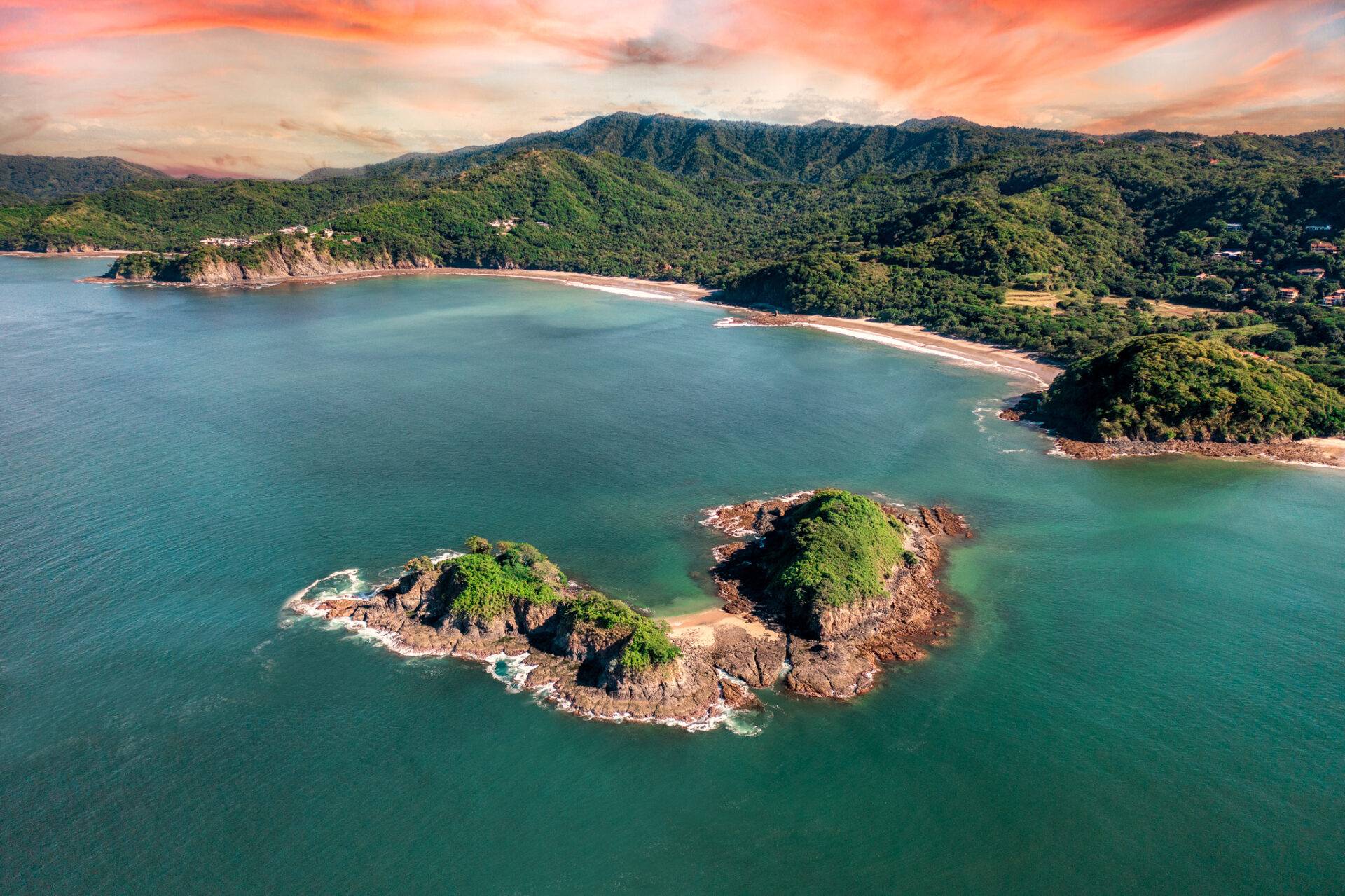Have you heard about the Costa Rica digital nomad visa? If you’re a remote worker, telecommuter, or digital nomad – or, if there’s a chance you could be a remote worker, telecommuter, or digital nomad – then the answer is almost certainly “yes.”
An excited, resounding, if a little bit unsure yes. Because, while you’ve heard about it and while you’re interested in it, you’re not quite sure whether the digital nomad visa is already available, whether you qualify, or what the requirements and advantages could be.
So, let’s get into it!
Here But Not: Waiting on the Costa Rica Digital Nomad Visa

Is the Costa Rica digital nomad visa your key to work and life in paradise?
To answer your most pressing question: As of this post’s publication (early 2022), the Costa Rica digital nomad visa (technically, not a visa! but more on that, in a moment) is approved but has not yet gone into effect.
So, what does that mean? We don’t want this post to devolve into Costa Rican Political Systems 101, so we’ll simplify: The digital nomad law was proposed in September 2020 and per legal requirements, was published in La Gaceta in October 2020. From there, it passed the two required Congressional debates (June 2021 and July 2021).
In December 2021, the bill was signed into law. But that doesn’t mean we’re ready to go (quite yet); the law is now pending publishing La Gaceta (again, a legal requirement) and then there will be a final ruling drafted and published.
Timeline to Application: Likely a few more months. If all goes as expected, the Costa Rica digital nomad visa (sometimes very incorrectly called a Costa Rica work visa) should be ready for applications before or around mid-2022.
The Costa Rica Digital Nomad Visa: Not Really a Visa
It may seem like semantics (and it is, to some degree… if you’re not a lawyer or an Immigration official!), but the Costa Rica digital nomad visa is actually an estancia, or right to reside.
The difference? Well, strictly speaking, Costa Rica doesn’t issue many visas. There are permisos (permits or permissions), estancias (the right to reside or stay long-term), and residency categories. For example, when you visit Costa Rica, you’re granted a tourist permiso; when you’re a digital nomad, you’re granted an estancia (long-term stay); and when you’re a traditional resident, you’re granted either temporary or permanent residency.
And, as we mentioned above, it’s not a Costa Rica work visa, either. As a digital nomad, you’re permitted to live in Costa Rica but not to work for a company domiciled here. (Understandably, Costa Rica is big on protecting employment for Costa Ricans.) In other words, the digital nomad estancia allows you only to work remotely for a foreign company. (A work visa, on the other hand, would allow you to work for any Costa Rican company you desired.)
And now that we have the jargon out of the way, let’s move on to the important stuff:
Costa Rica Digital Nomad Visa Requirements

Have laptop, will work from paradise! Does your job have enough flexibility for you to qualify for Costa Rica’s new digital nomad estancia?
One of the primary goals of the new digital nomad estancia is to create an easy and streamlined process for digital nomads to legally reside in Costa Rica. With that in mind, there are only two major requirements:
- $3,000-$4,000 Minimum Monthly Income: Individual digital nomads will be required to earn a foreign income of $3,000/month; this requirement increases to $4,000 for family (including dependents) and spouses may combine incomes to reach this threshold.
- Foreign-Earned Income: To qualify as a digital nomad, your income must be earned outside Costa Rica. (In other words, you cannot work for a company in Costa Rica, even remotely.) This requirement protects Costa Rican employment.
Of course, there are a few more details (but no additional requirements) to the law:
- Proof of Income: To demonstrate that you meet minimum monthly income requirements, you will likely (pending the drafted ruling, as explained above) be required to demonstrate at least a year’s worth of income of your monthly minimum.
- Family Unit: Rumor has it that, if you choose to apply as a family, you will be required to submit marriage and birth certificates, as necessary.
- Validity: Unlike the various residency options, the Costa Rica digital nomad visa will allow for a one-year estancia, renewable for an additional year, provided you have spent a minimum 180 days in Costa Rica during your first year.
- Medical Insurance: To protect Costa Rica’s medical system, digital nomads will be required to purchase medical insurance for the length of their stay. Details to be forthcoming.
- Application Fees: As with residency, digital nomads will be required to pay application fees and, if required, translation and stamp fees for paperwork (ex. birth certificates) presented in a language other than Spanish. Details to be forthcoming.
That’s it! If you make $3,000-$4,000/month and are willing to live in Costa Rica for at least 180 days/year (oh, the hardship!), then digital nomadship can be your future! And if that’s the case, you’re probably wondering, “what’s in it for me?”
Here’s what:
The Benefits of the Digital Nomad Estancia
Obviously, the biggest benefit is that you can legally stay in Costa Rica for up to one year (with an additional possible year’s extension). This differs from tourist status, which permits visitors to remain in Costa Rica for up to 90 days at a time (renewable upon exiting/re-entering the country).
There are additional benefits, as well:
- Quick Approval: One of the biggest benefits (and you know just how big it is, if you’ve ever waded through government bureaucracy!) is the quick approval process, especially when compared to other estancias and residency categories, which can take many months or years for approval.
- Tax Exemption: Digital nomads will be exempt from both Costa Rican income taxes and import taxes on work equipment. If you are a U.S. citizen, you may also qualify for the Foreign Earned Income Exclusion, which excludes up to $108,700 in earned income.
- Driving Privileges: You will be permitted to drive in Costa Rica on your home country license, for the extent of your estancia. This is significantly different than the rules for tourists and residents.
- Banking Privileges: With a digital nomad estancia, you will be able to open Costa Rican bank accounts – a difficult process, otherwise!
Thinking about Living in Costa Rica?
Applications are not yet open, but the country expects them to be soon. And we’re here to help, however we can.
And remember, if you’re not a digital nomad, there are still several paths you can take toward Costa Rican residency. There are four primary options – pensionado, rentista, inversionista, or first-degree relationship with a Costa Rican – each with its own benefits, requirements, and timeline.
We’re happy to discuss the options and help you decide which step to take next. We can refer you to residency attorneys or other sources of information, and are also happy to share our own experiences and lessons learned.
Because at Blue Water Properties of Costa Rica, we thrive on relationships and promise the fastest communication and best services in the industry. And that begins with lots of information. We are happy to answer your questions and point you in the right direction, including on all things related to the Costa Rica digital nomad visa.
We’re proud to offer some of the best Costa Rica real estate, from condos and homes to land and businesses for sale. So, go ahead – try us. Give us a chance to show off our expertise – and wow you with the possibilities! We look forward to it.


